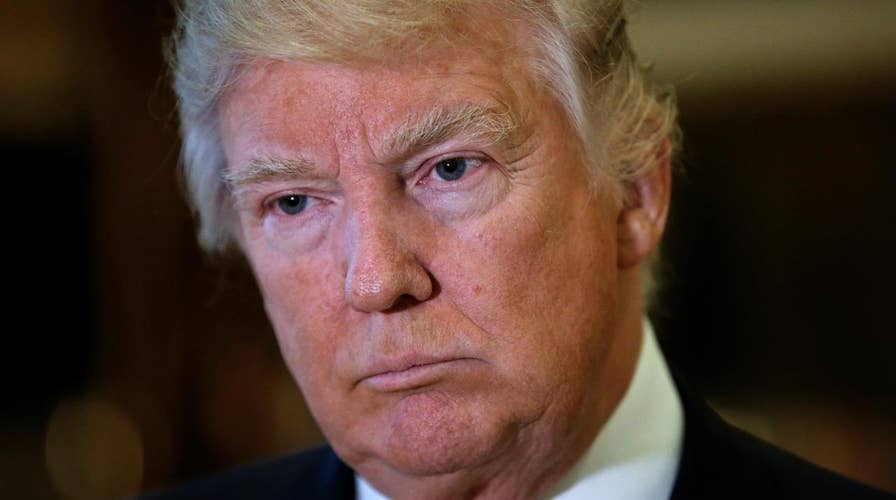President Trump plans full review of Dodd-Frank act
Trump set to sign executive order on financial regulations
President Trump signed an executive order Friday taking aim at the regulatory labyrinth created by Dodd-Frank, the massive 24,000-page law passed in the wake of the 2008 financial crisis.
“We expect to be cutting a lot out of Dodd-Frank,” Trump said, after morning meetings with business leaders.
The order directs the Treasury secretary to initiate a review and consult with regulatory agencies to identify changes to Dodd-Frank. It will not take effect immediately and awaits Senate confirmation of Trump’s Treasury Secretary nominee Steve Mnuchin.
Trump also signed a presidential memorandum that instructs the Labor Department to delay implementing an Obama-era rule that requires financial professionals who charge commissions to put their clients' best interests first when giving advice on retirement investments.
The rule was intended to prevent conflicts of interest by financial advisers and brokers. Opponents say it extends beyond the Labor Department’s authority.
While the financial oversight order won't have any immediate impact, the administration's intent is clear.
"The Dodd-Frank Act is a disastrous policy that's hindering our markets, reducing the availability of credit and crippling our economy's ability to grow and create jobs," said Press Secretary Sean Spicer.
Trump pledged during the transition that rolling back regulations, particularly 2010 Dodd-Frank law, would be a priority of his administration.
White House National Economic Council Director Gary Cohn echoed the president in an interview with Fox Business Network’s Maria Bartiromo.
Cohn argued regulations are “the biggest hindrance to job creation” and have a negative impact on banks’ lending practices.
“All banks have been under such regulatory scrutiny where they’ve been forced to literally build capital. Instead of lending capital ... to their clients and allowing them to grow their businesses and hire people and create jobs, they’ve been taking those reserves and taking that capital and hording it to meet the regulatory requirements and pay for additional regulations,” he said Friday morning.
The executive order is the “beginning of some of our executive actions to roll back regulations in the financial markets,” Cohn added.
Since its passage, there has been a surge in banking mergers and acquisitions, according to data compiled by Bloomberg News.
They reported that U.S. bank mergers increased to about $18 billion in 2016, the highest recorded level since 2009.
“We appreciate the administration’s support for pro-growth policies so banks can go even further in helping communities and our economy thrive,” said Rob Nichols, president of the American Bankers Association, in a statement.
“A sensible and careful review of Dodd-Frank and other financial regulations can and should strengthen those goals while unleashing the power of the banking industry — from small towns and communities to our nation’s financial centers — to fuel the increase in economic prosperity that we all seek,” added Nichols.
In its regulatory rollback, the administration has a willing partner in the Republican-controlled Congress which got the ball rolling this week.
On Wednesday, the House voted 235-187 to repeal a controversial Dodd-Frank requirement that publicly traded companies disclose confidential information related to the negotiation of business contracts.
The rule was vacated in 2013 by a federal judge on the grounds it was too arbitrary.
The SEC re-issued the rule last summer. But in an early morning Friday session, the Senate voted 52-47 to OK the House-approved measure, which President Trump is expected to sign.
Describing it as an “anti-corruption rule,” Sen. Sherrod Brown, D-OH, maintained repealing the regulation makes it easier for companies to hide their dealings with foreign governments, like Russia and China.
A source close to House Financial Services Committee Chairman Jeb Hensarling told Fox News the Texas Republican plans to reintroduce the Financial Choice Act in the coming weeks. The legislation is the only measure to date that proposes to repeal and replace Dodd-Frank.
The bill would repeal the authority of the Financial Stability Oversight Council (FSOC), which was intended to help rescue failing large firms without relying on government bailouts. It also would replace the head of the controversial Consumer Financial Protection Bureau with a five-member panel and establish an office of inspector general.
The Associated Press contributed to this report.






















